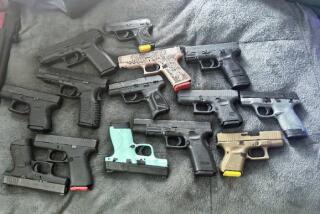Recycling Death for a Quick Buck : Policy of reselling confiscated guns is foolish
- Share via
Hard economic times have forced a growing number of cash-strapped cities to look to creative approaches to fund-raising. But the practice by some local governments of allowing police departments to raise cash by reselling firearms--after they have been confiscated from criminals--is dangerously irresponsible and not worthy of imitation.
County hospitals are teeming with new gunshot victims and law-enforcement officials are struggling to contain a epidemic of gun-related violence. Yet, at least six Southern California cities--including Ventura, Fullerton, Compton, Inglewood, Hawthorne and Alhambra--seem perversely focused on the marginal cash revenues generated by putting expropriated firearms back into circulation.
Some city officials justify the practice by maintaining that selling seized firearms is not new, nor is it against the law. And by dealing only in “collectible” and “high priced” firearms, they insist, “harmful” weapons such as assault rifles, cheap handguns and guns involved in “sensational murders” are still destroyed.
In reality, these excuses are transparent attempts to vindicate a practice that is blatantly and foolishly shortsighted. It strains credulity that just as federal and local law-enforcement agencies are stepping up efforts to get guns off the streets, these cities are recycling them back into a marketplace already saturated with firearms and incidents of gun violence.
It’s hard to imagine how the short-term benefits from limited gun sales would outweigh the potential costs for these jurisdictions. Last year, for instance, Los Angeles County hospitals treated more than 8,000 people for gunshot wounds at a cost of $54 million. Four-fifths of that amount was picked up by the taxpayers.
Given the cuts in state funding, many cities are in desperate need of money. But city officials should know better than to attempt something so cynical.
Admirably, the Los Angeles Police Department and the L.A. County Sheriff’s Department have a strict policy against selling confiscated weapons. That is the example that other cities should follow.
City governments do need more revenue--but it makes no sense to make money selling guns only to spend money repairing the havoc wrought by more guns on the street. With more 3,000 licensed gun dealers, the county already has an ample supply of firearms.
It’s safe to say that people will not miss the guns that are confiscated and destroyed. Neither will the thousands of victims of gun-related violence.
More to Read
Sign up for Essential California
The most important California stories and recommendations in your inbox every morning.
You may occasionally receive promotional content from the Los Angeles Times.










